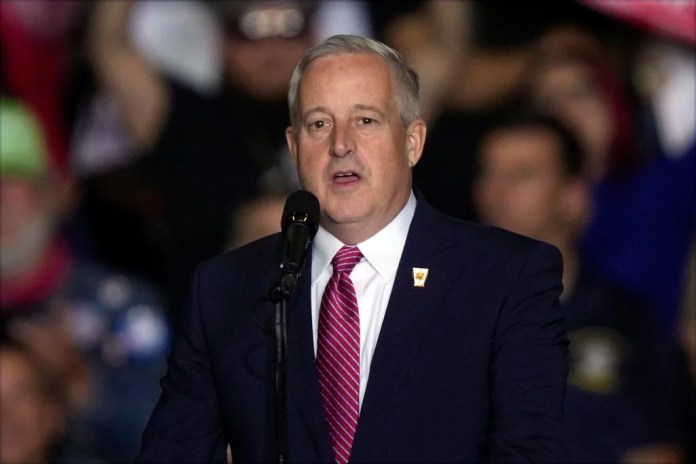Feds Keep Wasting Millions On N.C. Red Wolf Experiment
The U.S. government is investing meaningful taxpayer funds into red wolf conservation efforts in North Carolina, reportedly totaling nearly $328 million as part of a recovery plan initiated under President Biden’s governance. The plan aims to reestablish red wolf populations, which were declared extinct in the wild in 1980 and have been facing management challenges. Local landowners like Jett Ferebee have raised concerns about the adverse effects of these wolves on private property. Ferebee claims that the red wolves have bred with coyotes,leading to a decline in local wildlife and significant disruptions to his land,which he used for family recreation.
The program’s mortality rates and the number of wolves in the wild are alarmingly low, with estimates suggesting only 17-19 red wolves currently exist. Moreover,the Federal Highway Administration has allocated $25 million for wildlife crossings,as many of the released wolves have been struck by vehicles.
Ferebee argues that government mismanagement and a lack of transparency have turned the red wolf recovery effort into a “failed and illegally run program,” leading to a “hybrid swarm” of wolves and coyotes. He has documented incidents of hybrid animals on his property and voiced concerns about the government’s overreach in the conservation initiative. meanwhile, the Fish and Wildlife service (FWS) maintains that the recovery plan remains collaborative and focused on balancing conservation with local landowner interests. Ferebee’s experience highlights broader debates over environmental policy, land use, and government intervention in conservation efforts.
The federal government is spending millions of taxpayer dollars on red wolf experiments in North Carolina. But according to a nearby landowner, the government has a history of releasing wolves on private land — and then the wolves bred with coyotes and wreaked havoc on local wildlife.
The Fish and Wildlife Service (FWS) is continuing a plan set forth under former President Joe Biden’s administration to reestablish red wolves in North Carolina and beyond. The plan has an estimated price tag of nearly $328 million.
“We are committed to the strategy outlined in the recovery plan, particularly the focus on collaborative conservation,” an FWS representative told The Federalist.
In December, the Federal Highway Administration awarded $25 million in fiscal year 2024-2025 funds for highway wildlife crossings in North Carolina — because the wolves, after release, keep getting hit by cars.
The red wolf, native to the American South, was declared extinct in 1980. While the federal government has been releasing red wolves since 1987, it paused releases and the fostering of wolf pups from 2015 to 2020. But left-wing conservation groups sued, and FWS resumed the program during Biden’s administration.
The red wolf program had a 50-55 percent mortality rate in 2023. As of February this year, the “total estimate” was 17-19 red wolves in the wild, 16 of which were “known/collared.”
The Federalist asked the White House for comment, questioning whether this plan will continue under President Donald Trump’s administration and whether the Department of Government Efficiency (DOGE) has any plans for the program. Officials did not comment in time for publication.
A ‘Hybrid Swarm’
Jett Ferebee, a real estate developer, owned 2,000 acres near the Pocosin Lakes National Wildlife Refuge in Eastern North Carolina. He told The Federalist he used the land to take his children hunting.
“They’d always say, Dad, let’s go to the zoo. … It was so much wildlife, it was unreal,” Ferebee said. But in 2008, he wrote the Department of Interior, explaining red wolves were intruding on his property.
“All of a sudden, my dream of having land for my family to enjoy would not be of use because the government had basically overrun it with a wolf program,” Ferebee told The Federalist.
Over the coming years, Ferebee would embark on years of research and advocacy for private landowners. He eventually obtained documents by public records request, which he shared with The Federalist, showing that the federal government had been releasing wolves on private property from 1990 until at least 2013. In an email Ferbee provided to The Federalist, an FWS official explained that the agency did not have legal authority to do this.
Image CreditRed wolf release map
Image CreditRed wolf sightings map
Image CreditFWS email regarding release of red wolves on private land. Courtesy of Jett Ferebee
“While proven management techniques exist, we are also exploring innovative approaches to address ongoing challenges and help foster a broader appreciation for Red Wolves, particularly in ways that respect and align with private landowner interests,” an FWS representative told The Federalist.
From 2010 to 2012, Ferebee said, wolves overran his land. In 2012, FWS estimated a total population of 100-120 red wolves, though many bred with coyotes to create “hybrids.”
“Wolves had taken the farm over. There were no deer anymore, there were no quail anymore. There was no wildlife. Barren,” Ferebee said. “I’ve sat in the deer stand and had to call my wife to come pick us up at the bottom of the deer stand, because my children didn’t want to get out of the stand because of all the wolves. …”
He said it can be hard to tell the difference between wolves and coyotes, but that hybrids are “definitely bigger than a coyote.” Ferebee’s trail cameras captured multiple wolves, coyotes, and hybrids on his property.
Image CreditCourtesy of Jett Ferebee
Image CreditCourtesy of Jett Ferebee
Image CreditCourtesy of Jett Ferebee
Ferebee has trapped multiple such animals on his property so FWS could deal with them. “Not wanting to kill a wolf or to have a judge determine if it was an accident, I decided to trap my farm with a private trapper,” he wrote agency officials in an email.
In one 30-day period between January and February 2014, he caught 18 canines — including four red wolves, and thirteen coyotes or hybrids. Ferebee also obtained FWS records via FOIA showing the agency’s own trapping efforts. Officials trapped hybrids on private land from 1992 until at least 2014 and trapped wolves on private land from 1987 until at least 2012.
“It is about government overreach and squandering money on a failed and illegally run program, not the wolf itself,” he said. “The resulting failure is a hybrid swarm.”
“It was not about the wolf or his safety or viability,” Ferebee added, “it is about job[s], grants, legal and fundraising ability for NGOs.”
An FWS representative told The Federalist the agency is using a “collaborative approach, building trust, and building strong relationships” in Eastern North Carolina.
“Open communication, transparency, and input from the community and other contributors is needed to drive recovery,” the FWS representative said. “Decisions need to be made in the best interest of all involved and maintain the ecological, cultural and social integrity of the landscape.”
The Federalist asked the Department of the Interior for comment, but a representative said the department had nothing else to share.
A Case of ‘Sue and Settle’?
As mentioned earlier, the FWS temporarily stopped releasing red wolves in Eastern North Carolina in 2015, and the Southern Environmental Law Center sued FWS in 2020, claiming that when the agency stopped releasing captive red wolves it violated the Endangered Species Act. The SELC is a “left-of-center litigation group,” according to InfluenceWatch.
The SELC and FWS reached a settlement that required the agency to “recommit to the conservation of these rare wolves in the wild.” Throughout litigation, the SELC and FWS worked out a multi-phase release plan, and the court ordered the agency to implement it. Under the Biden administration, the FWC issued “Release Plans” for 2023-2024 and 2024-2025.
Jamie Clark, former director of FWS, was CEO of Defenders of Wildlife (one of the plaintiffs in the SELC lawsuit) at the time. Ferebee said he thinks the case was an example of “sue and settle as designed.”
“Sue and settle” cases are often known as “friendly lawsuits” — “cozy deals through which far-left radical environmental groups file lawsuits against federal agencies wherein court-ordered ‘consent decrees’ are issued based upon a prearranged settlement,” as Forbes contributor Larry Bell reported in 2013. From 1995 to 2010, the Environmental Protection Agency gave millions in tax dollars to left-wing groups like Earthjustice, the Sierra Club, and the Natural Resources Defense Council through such agreements.
Ferebee said his land “recovered well” when FWS stopped releasing the wolves on private property. “With Biden in, they ramped up their efforts,” according to Ferebee — but the problem has not yet returned.
“The released wolves are not surviving … therefore no problem,” Ferebee said. According to FWS, as of September, a car struck a male wolf, and there was “no indication” his litter survived. FWS has reported other wolf deaths or likely deaths.
Ferebee said he thinks the problem is not the red wolf but the program itself.
“I hadn’t said anything about a red wolf that I disliked. It was the government overreach. … You talk to anybody in Eastern North Carolina, they know the real story,” Ferebee said. “Do whatever the hell you want to on your land, but don’t take my farm and use it as a science project.”
Logan Washburn is a staff writer covering election integrity. He is a spring 2025 fellow of The College Fix. He graduated from Hillsdale College, served as Christopher Rufo’s editorial assistant, and has bylines in The Wall Street Journal, The Tennessean, and The Daily Caller. Logan is from Central Oregon but now lives in rural Michigan.
" Conservative News Daily does not always share or support the views and opinions expressed here; they are just those of the writer."




